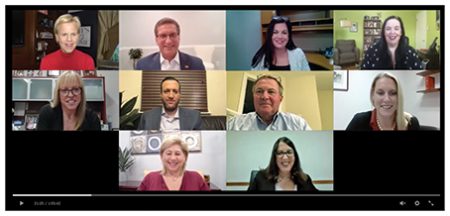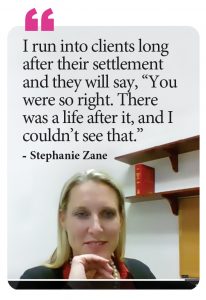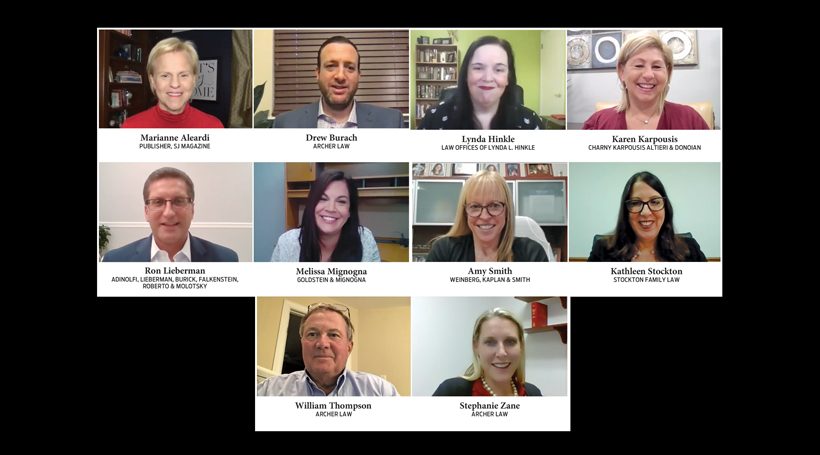Presented by

At a most devastating time for families – when it seems like problems are unfixable and the future holds little hope – there is one group that steps up to help: family law attorneys. They enter a world of heightened emotions as they work to guide clients through the many complex issues of divorce. (Throw in Covid and quarantine, and the complexity just multiplies.) Nine family law attorneys spoke with us about the long-lasting consequences of making smart decisions during your divorce. Their eye-opening candor and smart advice is especially interesting today. After a months-long lockdown, some families are realizing this just might be the help they need.
Participants:
Marianne Aleardi, Publisher, SJ Magazine
Drew Burach, Archer Law
Lynda Hinkle, Law Offices of Lynda L. Hinkle
Karen Karpousis, Charny Karpousis Altieri & Donoian
Ron Lieberman, Adinolfi, Lieberman, Burick, Falkenstein, Roberto & Molotsky
Melissa Mignogna, Goldstein & Mignogna
Amy Smith, Weinberg, Kaplan & Smith
Kathleen Stockton, Stockton Family Law
William Thompson, Archer Law
Stephanie Zane, Archer Law
ON MISCONCEPTIONS
They hear that Joe down the road got “X” in a settlement so that’s what they should get. Not every case is the same. Not every result is the same, and the facts in a family law case do matter.
Stephanie Zane
Some people think that both people have to agree to get divorced. That’s not the case.
Melissa Mignogna
People think if their spouse had an affair, that automatically they should get everything and the spouse who, in their opinion, was at fault should get nothing.
Karen Karpousis
The biggest misconception I see is clients who think divorce court is going to make them feel better, and they’re going to be able to show everybody how they’re right and the other person was wrong all along.
Lynda Hinkle
A lot of couples still think that, when dividing up the assets, it flows by title, as in, “That’s my retirement account, so I get to keep it. It’s in my name.” That’s not the way the law operates.
William Thompson
We still see clients saying, “Well, I’m the mom, so I’m going to automatically get more parenting time.” That’s not true.
Amy Smith
ON MEDIATION
Mediation involves just you and your former spouse. The 2 of you work on things and fashion remedies so you can resolve issues in a far more cost-effective capacity.
Drew Burach
A lot of the mediators have far more experience than some of the judges. Sometimes we get new judges who may have been in family law less than a year – compared to some of the mediators who have been practicing 30, 40 years.
Amy Smith
Because of the fear of how long the court process may take, people are looking at alternatives like mediation. When you say to them it could be a year or more before you’ll see the inside of a courthouse, that sometimes causes people to get it together, which leads us to come up with creative solutions.
Stephanie Zane
Mediation is valuable even if it only helps them focus on the issues that are most important, but not necessarily settle the case entirely.
Melissa Mignogna
Sometimes it helps the client to have a good mediator sit down with them and say, “Do you understand that if you go to court you may not get to keep the house simply because your husband moved out.” They suddenly understand this is a legitimate risk. They realize I haven’t been making this up.
William Thompson
ON DIVORCE
The contentious divorces are the ones that the courts and arbitrators see. But some people just come in and say, “Hey, we’ve already talked. We have a deal. Can you just help me prepare the agreement.”
Kathleen Stockton
If someone has committed a marital fault of one kind or another, that person always has a justification or excuse as to why they were driven to such extreme measures. As a practical matter, the courts very rarely get into marital fault unless it is absolutely egregious.
William Thompson
When you have reasonable people who want to get divorced, just as there was respect going into the marriage, there’s a level of respect on the way out.
Stephanie Zane
ON ADVICE FOR PARENTS ABOUT TO SEPARATE
Try to remain a family unit for the children. Forget about what’s going on in the litigation, or in your divorce, or in your own personal relationship. Show the children you both are still putting them first and are not going to make them choose sides.
Melissa Mignogna
Get your children into some age-appropriate therapy. They need someone else to talk to, no matter how great the parents are handling it.
Lynda Hinkle
You have to remind your clients that their child is half you and half the other parent. So if you speak badly about the other parent in front of that child, the child is going to think, subconsciously or consciously, that something is wrong with them.
Ron Lieberman

SOME MARRIAGE ADVICE
Pick and choose your battles, and make sure you listen. Take into consideration the other party’s point of view because marriage is always a big compromise.
Karen Karpousis
Practice reasonable communication because, even if the marriage fails, that will be useful in the end.
Lynda Hinkle
As much as I love my daughters to death, my relationship with my husband has to come first. Some couples lose sight of that. If they focus 100% on the kids, they forget what started it in the beginning. Focus on the family, but also remember the 2 of you.
Amy Smith
ON COVID-RELATED ISSUES
There is no precedent. I can’t go to the library, pull up the CDC guidelines, show them to a judge and say, “Here, you have to follow these.” That’s not binding in any of the trial courts in New Jersey.
William Thompson
Because this is an issue that none of us have ever faced before, we could put a client’s specific problem in front of 10 different judges and they may all have completely different opinions.
Melissa Mignogna
All of us are busier than we’ve ever been because if there was an issue in your marriage or there was a little bit of a crack in the foundation, being stuck in a house together has caused people to say, “I can’t do this anymore.”
Amy Smith
We’re trying to figure out how to resolve issues over which parent is quarantining better or whether school should be all remote or hybrid. It was tough enough for a judge to say that Sally is going to see Mommy on these days, and Sally is going to see Daddy on these days. Now the judge has to say, “I think remote learning or hybrid learning is the better option.” How is a judge going to make that call?
Ron Lieberman
ON CHALLENGING CLIENTS
One of the big red flags is when your adult client refuses to talk to you on the phone unless their parents are on the phone too.
William Thompson
We’ve all had those recordings, or text messages, or social media posts where we say to our client, “What were you thinking?” When we see something we know will be a problem during a custody evaluation, we need to have a very hard conversation and make sure they’re aware this is something they can’t do.
Kathleen Stockton
If we see the client doing something that’s counter to his or her goals or the expectations in the case, we’re going to advise them and speak about that. That’s why they retain us, and that’s what they should expect from us.
Drew Burach

ON QUESTIONS TO ASK BEFORE HIRING AN ATTORNEY
How long will this take? What options do I have? Can I do mediation? Can I do arbitration? Ask about the process and what you can expect. Ask about costs – the costs are always way more than anyone ever anticipates or plans for.
Kathleen Stockton
Ask whether your lawyer will be handling the case on their own or whether they’ll be working with an associate. Ask whether the associate will be handling it completely on their own.
Karen Karpousis
Find out if experts are needed, because that’s an additional cost beyond legal fees. Sometimes when people are taking unreasonable positions, they hear the cost of what an expert is going to run them, and all of a sudden their positions may change.
Stephanie Zane
THE REWARDS OF THEIR WORK
The person you see in your initial consult is not the person at the end of the case. And I think we’re at least partly responsible for getting them to look at things differently.
Amy Smith
You can have a client come in and talk to you, and you think to yourself, “I know what this case is all about. I know where we’re going with this.” And before you know it, it’s gone in a totally different direction. You learn what it’s like to go through that and to get them through one of the most difficult times in their life. That’s a rewarding feeling.
Ron Lieberman
Whatever the circumstances were, the client has transformed, and it’s really special to be part of their lives in that way. I have a client who sends me a Christmas card every year of her kids. It’s a reminder of what we do and why we do it.
Melissa Mignogna

ON VIRTUAL HEARINGS
I really miss being with my clients so I can give them the crazy eyes and grab their hand when they’re about to say something they shouldn’t.
Lynda Hinkle
You can be on a Zoom conference for a court hearing for a half-hour, where before you’d have to drive, park, wait in line, sit around for 3 or 4 or 5 hours and not get much else done workwise. Now you can multitask, and clients who were normally spending $1,000 for one court appearance may now spend $300.
Kathleen Stockton
ON CHILDREN AND DIVORCE
You have to have the conversation with the parent who was the primary one and say, “Through no fault of your own, you’re now going to see your child 50% of the time.” Those conversations are tough because they’re emotional. They’re not based necessarily on logic.
Ron Lieberman
You shouldn’t want your children to be involved in this litigation. But I still get the question: At what age can children make a decision on what parents they want to see? People come in saying, “Oh, my child’s 13. They have a say.” Not really. It can be considered, but they’re not going to run this show.
Melissa Mignogna
A lot of people get hung up on percentages, like “I want 50% of the time.” They don’t focus on what they’re capable of doing, given their work schedule and their other activities. You’ve got to focus on what you’re actually able to do.
William Thompson
ON DOMESTIC ABUSE CASES DURING COVID
When domestic violence matters are brought before the court, you see a really strong response time, a lot of detail, a lot of people following up. So the resources are there, but unfortunately, you don’t know how many cases you’re actually not seeing.
Drew Burach
Victims are afraid of coming forward. Some of them don’t know that the courts are still holding domestic violence trials. They’re also afraid that, should the final restraining order not be granted, they’re going to be back in the house without the ability to go apartment searching or stay with relatives because of Covid.
Karen Karpousis
I’m seeing more cases, but I’m not seeing people wanting to go forward as much. They’ll want to divorce, or do a motion, or do something else that is maybe less extreme hoping to resolve the problem without going the domestic violence route.
Lynda Hinkle

ON THE SJ LAW COMMUNITY
People are surprised that all attorneys don’t just automatically hate each other. The reality is we might litigate extensively, but that doesn’t mean we dislike the person. There’s a mutual respect that’s developed when you act in a professional capacity. And that’s to the benefit of the clients as well.
Drew Burach
Sometimes you see attorneys who don’t practice this area of law 100% of the time, and you can tell. They don’t put in the effort. They don’t know the things we all know by doing this every day. It makes a difference.
Kathleen Stockton
It’s important that attorneys don’t take on the persona of their clients. We are family law practitioners – we are not divorcing each other.
Karen Karpousis
Watch videos from the virtual discussion here.














